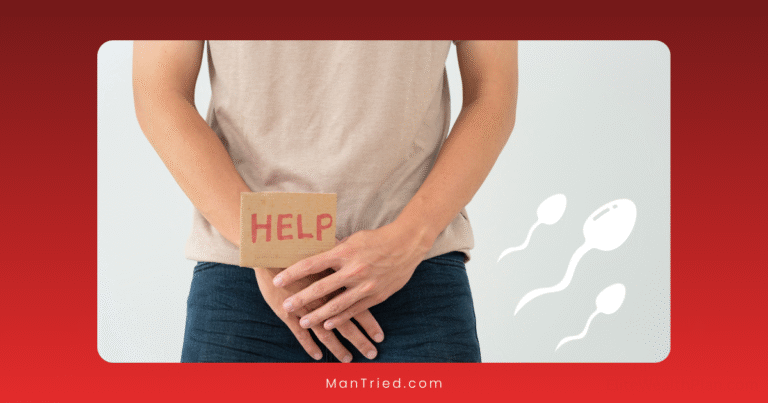Performance Anxiety vs. Physical ED: How to Tell the Difference

Mark was 34 when he first experienced it. In the middle of an intimate moment with his new partner, his erection suddenly faded. Embarrassed and confused, he made an excuse and left early. The next time they were together, all he could think about was whether it would happen again—and sure enough, it did.
“It became a self-fulfilling prophecy,” Mark recalls. “The more I worried about it, the worse it got. I was caught in a cycle I couldn’t break.”
Mark’s experience illustrates one of the most common sexual health challenges men face: distinguishing between psychological performance anxiety and physical erectile dysfunction (ED). While these conditions can create identical symptoms, their causes and treatments differ significantly. Understanding the difference is crucial for finding effective solutions.
The Overlapping Symptoms
Erectile dysfunction is defined as the inability to achieve or maintain an erection sufficient for satisfactory sexual performance. According to the National Institutes of Health, ED affects approximately 52% of men between ages 40 and 70, with prevalence increasing with age and comorbidities.
But what many don’t realize is that ED can stem from two very different sources:
- Psychological causes: Including performance anxiety, stress, depression, or relationship issues
- Physical causes: Including vascular problems, hormonal imbalances, neurological conditions, or medication side effects
“The challenge is that the symptoms look identical,” explains Dr. Sarah Chen, urologist at Boston Medical Center. “Whether it’s anxiety constricting blood vessels or atherosclerosis blocking them, the result is the same—insufficient blood flow to achieve or maintain an erection.”
Performance Anxiety: The Psychological ED
Performance anxiety affects approximately 9-25% of men, according to data from Allo Health. It occurs when worry about sexual performance triggers a stress response that physically interferes with erectile function.
The Anxiety-ED Cycle
The cycle typically follows this pattern:
- Initial trigger: A single instance of erectile difficulty, often due to fatigue, alcohol, or stress
- Performance anxiety develops: Fear of “failure” creates anticipatory anxiety
- Physiological response: Anxiety triggers release of stress hormones (cortisol, adrenaline)
- Blood vessel constriction: Stress hormones reduce blood flow to the penis
- Sexual difficulty occurs: Reinforcing the fear and worsening anxiety
- Cycle repeats and intensifies: Creating a psychological pattern that’s difficult to break
“It’s a perfect storm of mind and body working against each other,” notes Dr. Michael Torres, sex therapist. “The anxiety creates the very problem you’re afraid of, which then increases the anxiety further.”
Common Triggers for Performance Anxiety
Several factors can initiate or worsen this cycle:
- New relationships or partners: Pressure to impress or perform well
- Relationship problems: Unresolved conflicts affecting intimacy
- Body image concerns: Insecurity about physical appearance
- Unrealistic expectations: Often influenced by pornography
- Previous “failures”: Past experiences creating fear of recurrence
- Life stressors: Work pressure, financial concerns, etc.
- Fear of pregnancy or STIs: Creating background anxiety during sex
Physical ED: When the Body Is the Problem
Physical or organic ED results from medical conditions that directly impact the physiological mechanisms of erection. According to Medical News Today, common causes include:
Vascular Issues
Since erections depend on blood flow, vascular problems are the most common physical cause of ED:
- Atherosclerosis: Plaque buildup in arteries restricting blood flow
- Hypertension: Damages blood vessels over time
- Cardiovascular disease: Affects overall circulation
- Diabetes: Damages both blood vessels and nerves
- High cholesterol: Contributes to blood vessel narrowing
Hormonal Factors
- Low testosterone: Affects both libido and erectile function
- Thyroid imbalances: Can disrupt sexual function
- Elevated prolactin: Suppresses sexual response
Neurological Conditions
- Spinal cord injuries: Disrupt nerve signals to the penis
- Multiple sclerosis: Affects nerve conduction
- Parkinson’s disease: Impacts autonomic nervous system function
- Diabetic neuropathy: Damages nerves throughout the body
Medication Side Effects
Many common medications can contribute to ED:
- Antihypertensives: Especially beta-blockers
- Antidepressants: Particularly SSRIs
- Antihistamines: Can affect erectile function
- Opioid pain medications: Suppress testosterone production
- Some prostate medications: Can impact erectile function
Key Differences: How to Tell Them Apart
While the symptoms may look the same, several clues can help distinguish between performance anxiety and physical ED:
1. Situational vs. Consistent
Performance Anxiety:
- Erections are possible in some situations but not others
- Morning erections and spontaneous erections occur normally
- Function may be better during masturbation than partnered sex
- Performance varies based on mood, partner, or setting
Physical ED:
- Difficulty occurs consistently across all situations
- Morning erections may be reduced or absent
- Similar difficulties with both masturbation and partnered sex
- Gradual worsening of function over time
2. Sudden vs. Gradual Onset
Performance Anxiety:
- Often begins suddenly, frequently after a specific event
- May come and go or vary in severity
- Can develop at any age
Physical ED:
- Usually develops gradually
- Tends to worsen progressively over time
- More common with increasing age
- Often coincides with other health issues
3. Psychological Symptoms
Performance Anxiety:
- Anticipatory anxiety before sexual encounters
- Racing thoughts during intimacy
- Hyperawareness of bodily sensations
- Avoidance of sexual situations
- Feelings of shame or inadequacy
Physical ED:
- Less anticipatory anxiety (until secondary performance anxiety develops)
- Frustration about the physical issue
- May have other symptoms of underlying conditions (fatigue, pain, etc.)
4. Response to Distraction
Performance Anxiety:
- Function may improve when distracted from performance concerns
- May respond well to alcohol initially (by reducing inhibitions)
- Better when relaxed and not focusing on performance
Physical ED:
- Distraction makes little difference to erectile function
- Alcohol tends to worsen function
- Relaxation alone doesn’t resolve the issue
The Diagnostic Process
If you’re experiencing erectile difficulties, a proper diagnosis is essential for effective treatment. According to Precise Men’s Medical, this typically involves:
Medical History
- Detailed sexual history, including onset and pattern of difficulties
- Review of medical conditions and medications
- Assessment of lifestyle factors (smoking, alcohol, exercise, etc.)
- Screening for psychological factors (stress, anxiety, depression)
Physical Examination
- Cardiovascular assessment (blood pressure, heart rate)
- Genital examination
- Neurological screening
- Assessment of secondary sex characteristics
Laboratory Tests
- Testosterone levels
- Blood glucose and HbA1c (for diabetes)
- Lipid profile (cholesterol)
- Thyroid function
- Prolactin levels if indicated
Specialized Tests (if needed)
- Nocturnal penile tumescence (NPT) testing to assess nighttime erections
- Doppler ultrasound to evaluate blood flow
- Intracavernosal injection test to assess vascular response
“The NPT test is particularly useful for distinguishing psychological from physical causes,” explains Dr. James Harrison, urologist. “If a man has normal erections during sleep but not during sexual activity, that strongly suggests a psychological component.”
Treatment Approaches: Targeting the Right Cause
Effective treatment depends on correctly identifying the underlying cause of erectile difficulties:
For Performance Anxiety
Psychological Therapies:
- Cognitive Behavioral Therapy (CBT): Addresses negative thought patterns and anxiety
- Mindfulness techniques: Helps focus attention on present sensations rather than performance
- Sensate focus exercises: Reduces performance pressure through gradual, non-demanding intimate touch
Communication Strategies:
- Open discussion with partners about concerns
- Setting realistic expectations
- Focusing on pleasure rather than performance
Stress Management:
- Regular exercise
- Meditation and deep breathing
- Adequate sleep
- Reducing overall life stressors
Short-Term Medication Support:
- PDE5 inhibitors (Viagra, Cialis, etc.) can break the anxiety cycle
- Used temporarily while addressing psychological factors
- Success rates improve when combined with therapy
According to Healthline, most men see significant improvement in performance anxiety ED within 4-8 weeks of consistent therapy and practice.
For Physical ED
Medical Treatments:
- PDE5 inhibitors: First-line treatment for most forms of ED
- Intracavernosal injections: For men who don’t respond to oral medications
- Vacuum erection devices: Non-pharmaceutical option
- Penile implants: Surgical option for severe cases
Treating Underlying Conditions:
- Managing diabetes, hypertension, or heart disease
- Hormone replacement for low testosterone
- Medication adjustments if side effects are the cause
Lifestyle Modifications:
- Smoking cessation
- Reduced alcohol consumption
- Weight management
- Regular physical activity
- Heart-healthy diet
When Both Factors Are Present: The Mixed Picture
In reality, many men experience a combination of psychological and physical factors. According to the National Institutes of Health, even men with clear physical causes often develop secondary psychological issues:
“A man with mild vascular insufficiency might still achieve erections under optimal conditions,” explains Dr. Chen. “But once he experiences a few difficulties and develops anxiety about it, the psychological component can tip the scales, making a manageable physical issue into a consistent problem.”
This is why comprehensive treatment often addresses both aspects:
- Medical intervention for the physical component
- Psychological support for the anxiety component
- Lifestyle optimization to improve overall sexual health
The Partner Factor: Relationship Dynamics
Partners play a crucial role in both the development and resolution of erectile difficulties:
Potential Challenges:
- Partner may feel rejected or unattractive
- Misinterpretation of the problem as lack of attraction
- Pressure (even well-intentioned) that worsens anxiety
- Avoidance of intimacy creating relationship strain
Supportive Approaches:
- Open, non-judgmental communication
- Focusing on intimacy beyond penetrative sex
- Participating in treatment as appropriate
- Patience during the resolution process
“Including partners in the treatment process often leads to better outcomes,” notes Dr. Torres. “When both people understand what’s happening and work together, recovery tends to be faster and more complete.”
Prevention Strategies
Whether you’ve experienced erectile difficulties or want to prevent them, several approaches can help:
For Preventing Performance Anxiety:
- Maintain realistic expectations about sexual performance
- Focus on pleasure and connection rather than “performance”
- Practice good stress management in daily life
- Communicate openly with partners about needs and concerns
- Consider counseling during major life transitions or relationship changes
For Preventing Physical ED:
- Regular cardiovascular exercise
- Heart-healthy diet
- Maintain healthy weight
- Regular medical checkups
- Prompt treatment of chronic conditions like diabetes or hypertension
- Moderate alcohol consumption
- Avoid smoking and recreational drugs
The Bottom Line
Erectile difficulties, whether from performance anxiety or physical causes, are both common and treatable. The key is accurate identification of the underlying factors and appropriate, targeted treatment.
“The worst thing men can do is suffer in silence,” emphasizes Dr. Harrison. “Erectile dysfunction—whether psychological or physical—is a medical condition, not a reflection of masculinity or worth. With proper care, the vast majority of men can return to satisfying sexual function.”
If you’re experiencing erectile difficulties, consider these steps:
- Consult a healthcare provider for proper evaluation
- Be completely honest about your symptoms and concerns
- Consider both physical and psychological factors
- Include your partner in the conversation when appropriate
- Follow through with recommended treatments
- Be patient as you work toward improvement
Remember Mark from the beginning of our story? After consulting with a healthcare provider, he discovered his ED was primarily due to performance anxiety. Through a combination of cognitive behavioral therapy, mindfulness practices, and temporary use of medication, he was able to break the anxiety cycle.
“Learning it was mainly in my head was both frustrating and liberating,” Mark says. “Frustrating because I felt I should have been able to control it, but liberating because it meant I could overcome it. And I did.”
Have you dealt with erectile difficulties? What helped you determine the cause and find effective solutions? Share your experience in the comments below.






